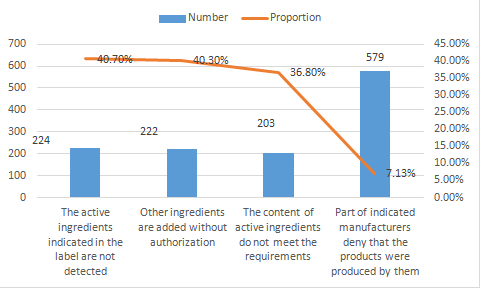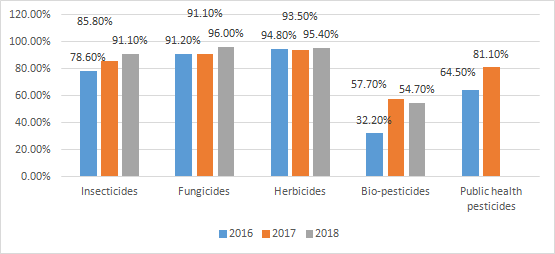Recently, the Ministry of Agriculture and Rural Affairs (MoARA) of the People’s Republic of China has issued the results of national spot-check for pesticides in 2018. Pesticides were sampled by routine spot check, key spot check, special spot check, in accordance with the "Random and Open" requirement. The focus of sample check was on pesticides used in crops such as vegetables, fruit trees, tea trees, rice, wheat, corn, cotton, soybeans and so on. There were 8119 pesticide samples from 29 provinces (districts, municipalities) and overseas enterprises. Among them, 7568 were qualified samples, accounting for 93.2%; 551 were unqualified samples, accounting for 6.8%. 370 of the unqualified sample were fake pesticides (Labeled active ingredients were not detected or other ingredients were added). They accounted for 4.6% of the total samples, and accounted for 67.2% of the unqualified samples.
Unqualified products mainly had the following problems:
(1) The labeled active ingredients are not detected;
(2) Other ingredients, even highly toxic pesticides, such as Paraquat, are added without authorization;
(3) The content of active ingredients do not meet the requirements; and
(4) Some labeled manufacturers denied that the products were produced by them.
Details are shown in Fig 1.

Fig 1. Main problems of unqualified pesticide products
Random check and inspection is an effective measure for market supervision of pesticides. It plays an important role in ensuring effective control of crop pests and disease, as well as guaranteeing the quality and safety of pesticides and agricultural products. In recent years, due to the reform of administrative examination and approval system, the focus of supervision has been switched from the previous “excessive emphasis on approval procedures, insufficient attention to regulatory processes” to current “relaxation on approval procedures, sufficient attention to market regulation”, the supervision for pesticides after registrations is now becoming more and more strict. According to the statistics, 5475 pesticides were sampled in 2016, 4695 qualified pesticides, accounting for 85.8%; 780 unqualified pesticides, accounting for 14.2%. While in 2017, the total sample amount is 5029, with 4472 qualified pesticides and 557 unqualified products, accounting for 88.9% and 11.1%, respectively. When compared with the inspection results in 2018, it can be found that the quality of pesticides has been constantly improved in recent three years. CIRS also collected and analyzed the pass rate of different types of pesticide products, such as insecticides, fungicides, herbicides, bio-pesticides and public health pesticides, in the past three years. Details are shown in Fig 2. It can be found that the pass rate of similar products is also on the rise.

Fig 2. Statistics on the pass rate of different types of pesticide products in the past three years
Overall, the pass rate of pesticide products is increasing year by year, which on one hand is because of stronger and stronger supervision from the law enforcement departments, and the other hand, is because more and more attention is put on pesticide quality by the manufacturers. Even with increasing pass rate, bio-pesticides still have a lot of problems in quality and their pass rate is always the lowest when compared with other pesticides. The reason is that the products were illegally added with other chemical components, or not detected the labeled active ingredients. Due to the environmental-friendly feature, bio-pesticides have always been supported by the government. However, the pesticide effect is not up to standard in practical use. For another kind of pesticides, public health pesticides are the most commonly used pesticide products for ordinary residents, but its pass rate is significantly lower than agricultural pesticides. It is mainly related to loose supervision, the authorities are focusing on the quality and safety of agriculture pesticides, and due to limited human resources, very few inspections are performed for public health pesticides, which leads to the entry of many unqualified pesticides. In addition, enterprises and authorities pay insufficient attention to such products. They thought getting the registration certificate is enough, while quality of the products after registrations is not taken seriously. For some new types of mosquito repellent products, like mosquito patch and mosquito repellent bracelet, due to the lack of corresponding standards, enterprises even do not know how to register them, the products’ quality cannot be guaranteed neither.
In response to tightened supervision, the enterprises should notice the following points:
- In China, pesticide production enterprises should obtain pesticide production licenses which are mandatory for domestic pesticides. "Regulation on Pesticide Administration (RPA)" specifies that it is illegal for production enterprises to produce pesticides without pesticide production license or with false license. These companies will be severely punished.
- In China, except public health pesticides, companies or individuals must obtain a pesticide business license before selling pesticides. This also includes online sales (Restricted pesticides are not allowed to be sold online).
- Pesticide labels function like an "I. D. card" for pesticide products, whether for domestic pesticides or for imported pesticides, a Chinese label prepared according to the “Measures on the management of pesticide labels and instructions” and the properties of the product are mandatory. Besides, the quality of the product must match the one claimed on the label, it is strongly forbidden to add unlabeled ingredients to the products.
- For all pesticide products, including imported pesticides, the label should include the two-dimensional code in accordance with the "Measures on 2D codes of pesticide labels".
- The authenticity and traceability of the two-dimensional code are parts of the inspection. For pesticides produced after January 1, 2018, two-dimensional code has been inspected as an indicator of compliance.
- Product specification test, product quality inspection test, stability test at room temperature, and other tests should be carried out in qualified Chinese laboratories verified by MoARA, which will ensure the reliability and accuracy of the tests, and ensure that the quality of the products within their validity is in line with the requirements. If not or if the products are sold after expiration, the pesticides will be treated as inferior products in accordance with the RPA.
With the implementation of the new RPA and improvement of threshold in pesticide industry, pesticide enterprises will face more and more challenges in China market. However, the only way to deal with that is to positively improve pesticide products’ quality and to comply strictly with the regulatory requirements. That is also what CIRS always advise to their clients.
If you have any needs or questions, please feel free to contact us at service@jianzaoshiwang.cn.

